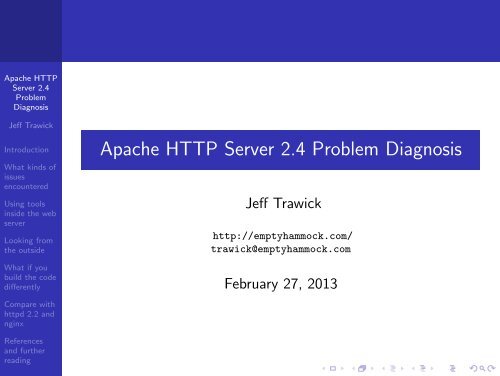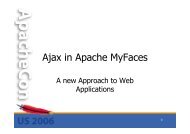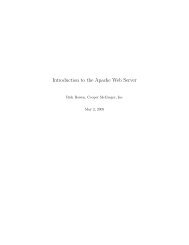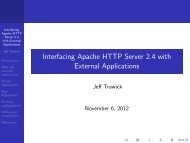Apache HTTP Server 2.4 Problem Diagnosis
Apache HTTP Server 2.4 Problem Diagnosis
Apache HTTP Server 2.4 Problem Diagnosis
Create successful ePaper yourself
Turn your PDF publications into a flip-book with our unique Google optimized e-Paper software.
<strong>Apache</strong> <strong>HTTP</strong><br />
<strong>Server</strong> <strong>2.4</strong><br />
<strong>Problem</strong><br />
<strong>Diagnosis</strong><br />
Jeff Trawick<br />
Introduction<br />
What kinds of<br />
issues<br />
encountered<br />
Using tools<br />
inside the web<br />
server<br />
Looking from<br />
the outside<br />
What if you<br />
build the code<br />
differently<br />
Compare with<br />
httpd 2.2 and<br />
nginx<br />
<strong>Apache</strong> <strong>HTTP</strong> <strong>Server</strong> <strong>2.4</strong> <strong>Problem</strong> <strong>Diagnosis</strong><br />
Jeff Trawick<br />
http://emptyhammock.com/<br />
trawick@emptyhammock.com<br />
February 27, 2013<br />
References<br />
and further<br />
reading
Get these slides...<br />
<strong>Apache</strong> <strong>HTTP</strong><br />
<strong>Server</strong> <strong>2.4</strong><br />
<strong>Problem</strong><br />
<strong>Diagnosis</strong><br />
Jeff Trawick<br />
Introduction<br />
What kinds of<br />
issues<br />
encountered<br />
Using tools<br />
inside the web<br />
server<br />
http://emptyhammock.com/projects/info/slides.html<br />
Looking from<br />
the outside<br />
What if you<br />
build the code<br />
differently<br />
Compare with<br />
httpd 2.2 and<br />
nginx<br />
References<br />
and further<br />
reading
Table of Contents<br />
<strong>Apache</strong> <strong>HTTP</strong><br />
<strong>Server</strong> <strong>2.4</strong><br />
<strong>Problem</strong><br />
<strong>Diagnosis</strong><br />
Jeff Trawick<br />
Introduction<br />
What kinds of<br />
issues<br />
encountered<br />
Using tools<br />
inside the web<br />
server<br />
Looking from<br />
the outside<br />
What if you<br />
build the code<br />
differently<br />
Compare with<br />
httpd 2.2 and<br />
nginx<br />
References<br />
and further<br />
reading<br />
1 Introduction<br />
2 What kinds of issues encountered<br />
3 Using tools inside the web server<br />
4 Looking from the outside<br />
5 What if you build the code differently<br />
6 Compare with httpd 2.2 and nginx<br />
7 References and further reading
Introduction — Who am I?<br />
<strong>Apache</strong> <strong>HTTP</strong><br />
<strong>Server</strong> <strong>2.4</strong><br />
<strong>Problem</strong><br />
<strong>Diagnosis</strong><br />
Jeff Trawick<br />
Introduction<br />
What kinds of<br />
issues<br />
encountered<br />
Using tools<br />
inside the web<br />
server<br />
Looking from<br />
the outside<br />
What if you<br />
build the code<br />
differently<br />
I’ve worked on <strong>Apache</strong> httpd and APR since 2000.<br />
I had customer support responsibilities for most of that<br />
time.<br />
I’ve been very interested in patches to httpd or new httpd<br />
capabilities which make it easier to diagnose problems.<br />
In the last year I’ve been able to revisit some earlier efforts<br />
on httpd diagnosability; I’ll mention a few of these<br />
projects (or experiments) during this talk.<br />
Compare with<br />
httpd 2.2 and<br />
nginx<br />
References<br />
and further<br />
reading
Introduction — What will we attempt to cover?<br />
<strong>Apache</strong> <strong>HTTP</strong><br />
<strong>Server</strong> <strong>2.4</strong><br />
<strong>Problem</strong><br />
<strong>Diagnosis</strong><br />
Jeff Trawick<br />
Introduction<br />
What kinds of<br />
issues<br />
encountered<br />
Using tools<br />
inside the web<br />
server<br />
Looking from<br />
the outside<br />
What if you<br />
build the code<br />
differently<br />
Cover the basics in a reasonably broad manner, but when<br />
in doubt be sure to touch on new httpd <strong>2.4</strong> features since<br />
knowledge of basic httpd debugging techniques is<br />
prevalent.<br />
Summarize the techniques which are different with httpd<br />
2.2.<br />
Conclude with some examples showing how debugging<br />
issues with nginx can differ considerably.<br />
Compare with<br />
httpd 2.2 and<br />
nginx<br />
References<br />
and further<br />
reading
What kinds of issues encountered<br />
<strong>Apache</strong> <strong>HTTP</strong><br />
<strong>Server</strong> <strong>2.4</strong><br />
<strong>Problem</strong><br />
<strong>Diagnosis</strong><br />
Jeff Trawick<br />
Introduction<br />
What kinds of<br />
issues<br />
encountered<br />
Using tools<br />
inside the web<br />
server<br />
Looking from<br />
the outside<br />
What if you<br />
build the code<br />
differently<br />
Compare with<br />
httpd 2.2 and<br />
nginx<br />
References<br />
and further<br />
reading<br />
Crash<br />
Hang of server<br />
Stall of individual requests<br />
Termination<br />
Bad response time<br />
Limited concurrency without problem symptoms<br />
High CPU<br />
High memory<br />
High consumption of other pooled resources<br />
Incorrect output - wrong transformation<br />
Incorrect output - missing/bad protocol element
Non-problems<br />
<strong>Apache</strong> <strong>HTTP</strong><br />
<strong>Server</strong> <strong>2.4</strong><br />
<strong>Problem</strong><br />
<strong>Diagnosis</strong><br />
Jeff Trawick<br />
Introduction<br />
What kinds of<br />
issues<br />
encountered<br />
Using tools<br />
inside the web<br />
server<br />
Validate behavior of new software/configuration<br />
Understand steady-state behavior for baseline when<br />
something is wrong<br />
Looking from<br />
the outside<br />
What if you<br />
build the code<br />
differently<br />
Compare with<br />
httpd 2.2 and<br />
nginx<br />
References<br />
and further<br />
reading
Using tools to look inside the web server<br />
<strong>Apache</strong> <strong>HTTP</strong><br />
<strong>Server</strong> <strong>2.4</strong><br />
<strong>Problem</strong><br />
<strong>Diagnosis</strong><br />
Jeff Trawick<br />
Introduction<br />
What kinds of<br />
issues<br />
encountered<br />
Using tools<br />
inside the web<br />
server<br />
Looking from<br />
the outside<br />
What if you<br />
build the code<br />
differently<br />
Logging (the information itself, the timestamp, information<br />
about other processing at about the same time)<br />
OS-level tools (view use of resources, whether discrete<br />
items like files or continuous like CPU)<br />
CPU-, code-level tools (determine what code is running<br />
frequently, what is running for the request, analyze<br />
memory references, walk through the processing of a<br />
request, etc.)<br />
Compare with<br />
httpd 2.2 and<br />
nginx<br />
References<br />
and further<br />
reading
Careful with logging!<br />
<strong>Apache</strong> <strong>HTTP</strong><br />
<strong>Server</strong> <strong>2.4</strong><br />
<strong>Problem</strong><br />
<strong>Diagnosis</strong><br />
Jeff Trawick<br />
Introduction<br />
What kinds of<br />
issues<br />
encountered<br />
Using tools<br />
inside the web<br />
server<br />
Looking from<br />
the outside<br />
What if you<br />
build the code<br />
differently<br />
Compare with<br />
httpd 2.2 and<br />
nginx<br />
As you increase the level of logging, you increase the chances<br />
that private data will be logged.<br />
Passwords<br />
Session keys<br />
???<br />
Of particular interest:<br />
mod dumpio, mod log config when configured to log<br />
certain request or response header files, mod log forensic,<br />
http when configured at higher trace levels, ...<br />
References<br />
and further<br />
reading
Logging<br />
<strong>Apache</strong> <strong>HTTP</strong><br />
<strong>Server</strong> <strong>2.4</strong><br />
<strong>Problem</strong><br />
<strong>Diagnosis</strong><br />
Jeff Trawick<br />
Introduction<br />
What kinds of<br />
issues<br />
encountered<br />
Using tools<br />
inside the web<br />
server<br />
Error log<br />
Looking from<br />
the outside<br />
What if you<br />
build the code<br />
differently<br />
Compare with<br />
httpd 2.2 and<br />
nginx<br />
References<br />
and further<br />
reading
Error log records<br />
<strong>Apache</strong> <strong>HTTP</strong><br />
<strong>Server</strong> <strong>2.4</strong><br />
<strong>Problem</strong><br />
<strong>Diagnosis</strong><br />
Jeff Trawick<br />
Introduction<br />
What kinds of<br />
issues<br />
encountered<br />
Using tools<br />
inside the web<br />
server<br />
Looking from<br />
the outside<br />
What if you<br />
build the code<br />
differently<br />
Compare with<br />
httpd 2.2 and<br />
nginx<br />
References<br />
and further<br />
reading<br />
Configurable content<br />
Fields dropped when information is unavailable<br />
Third-party modules can implement their own fields<br />
Typical message:<br />
[Sun Oct 28 13:37:27.676386 2012] \<br />
[-:error] \<br />
[pid 14340:tid 140625844377344] \<br />
[client 127.0.0.1:50837] \<br />
mod_wsgi (pid=14340): Target WSGI script \<br />
’/home/trawick/myhg/apache/documents/AC20\<br />
12EU/lookup.wsgi’ does not contain WSGI a\<br />
pplication ’application’.
Detailed logging only for specified client IP<br />
<strong>Apache</strong> <strong>HTTP</strong><br />
<strong>Server</strong> <strong>2.4</strong><br />
<strong>Problem</strong><br />
<strong>Diagnosis</strong><br />
Jeff Trawick<br />
Introduction<br />
What kinds of<br />
issues<br />
encountered<br />
Using tools<br />
inside the web<br />
server<br />
Looking from<br />
the outside<br />
What if you<br />
build the code<br />
differently<br />
Compare with<br />
httpd 2.2 and<br />
nginx<br />
References<br />
and further<br />
reading<br />
LogLevel info<br />
<br />
<br />
LogLevel trace8<br />
<br />
<br />
Only works once request processing has reached a certain<br />
point. Connection-level issues which occur before that<br />
point won’t be logged.<br />
The unexpected Location container workaround is needed<br />
in <strong>2.4</strong>.0–<strong>2.4</strong>.3, but the issue is resolved in trunk and<br />
hopefully the workaround will not be needed in <strong>2.4</strong>.4.
Detailed logging for problematic requests<br />
<strong>Apache</strong> <strong>HTTP</strong><br />
<strong>Server</strong> <strong>2.4</strong><br />
<strong>Problem</strong><br />
<strong>Diagnosis</strong><br />
Jeff Trawick<br />
Introduction<br />
What kinds of<br />
issues<br />
encountered<br />
Using tools<br />
inside the web<br />
server<br />
Looking from<br />
the outside<br />
LogLevel info<br />
<br />
LogLevel trace8<br />
<br />
What if you<br />
build the code<br />
differently<br />
Compare with<br />
httpd 2.2 and<br />
nginx<br />
References<br />
and further<br />
reading
(Mostly) <strong>HTTP</strong> layer logging at different levels<br />
<strong>Apache</strong> <strong>HTTP</strong><br />
<strong>Server</strong> <strong>2.4</strong><br />
<strong>Problem</strong><br />
<strong>Diagnosis</strong><br />
Jeff Trawick<br />
Introduction<br />
What kinds of<br />
issues<br />
encountered<br />
Using tools<br />
inside the web<br />
server<br />
Looking from<br />
the outside<br />
What if you<br />
build the code<br />
differently<br />
Compare with<br />
httpd 2.2 and<br />
nginx<br />
References<br />
and further<br />
reading<br />
[core:trace5] Request received from client: GET / <strong>HTTP</strong>/1.1<br />
[http:trace4] Headers received from client:<br />
[http:trace4] Connection: keep-alive<br />
[http:trace4] Cache-Control: max-age=0<br />
[http:trace4] User-Agent: Mozilla/5.0 (X11; Linux x86_64)<br />
[http:trace4] Accept: text/html,application/xhtml+xml,app<br />
[http:trace4] Accept-Encoding: gzip,deflate,sdch<br />
[http:trace4] Accept-Language: en-US,en;q=0.8<br />
[http:trace4] Accept-Charset: ISO-8859-1,utf-8;q=0.7,*;q=<br />
[http:trace4] If-None-Match: \\"2d-4b1922bade1c0\\"<br />
[http:trace4] If-Modified-Since: Sat, 12 Nov 2011 23:41:0<br />
[http:trace3] Response sent with status 304, headers:<br />
[http:trace5] Date: Tue, 06 Nov 2012 12:18:57 GMT<br />
[http:trace5] <strong>Server</strong>: <strong>Apache</strong>/<strong>2.4</strong>.4-dev (Unix) OpenSSL/1.0
mod log debug<br />
<strong>Apache</strong> <strong>HTTP</strong><br />
<strong>Server</strong> <strong>2.4</strong><br />
<strong>Problem</strong><br />
<strong>Diagnosis</strong><br />
Jeff Trawick<br />
Introduction<br />
What kinds of<br />
issues<br />
encountered<br />
Using tools<br />
inside the web<br />
server<br />
Looking from<br />
the outside<br />
What if you<br />
build the code<br />
differently<br />
Compare with<br />
httpd 2.2 and<br />
nginx<br />
Configurable debug logging mechanism using new<br />
LogMessage directive.<br />
Different ways to think of it:<br />
Generate custom trace or error messages for processing of<br />
interest to you.<br />
Track interesting values as they change (or not) during<br />
request processing.<br />
Conditional expression support with access to dynamic<br />
values is provided by the new ap expr support.<br />
http://httpd.apache.org/docs/<strong>2.4</strong>/expr.html<br />
References<br />
and further<br />
reading
mod log debug – sample configuration<br />
<strong>Apache</strong> <strong>HTTP</strong><br />
<strong>Server</strong> <strong>2.4</strong><br />
<strong>Problem</strong><br />
<strong>Diagnosis</strong><br />
Jeff Trawick<br />
Introduction<br />
What kinds of<br />
issues<br />
encountered<br />
Using tools<br />
inside the web<br />
server<br />
Looking from<br />
the outside<br />
What if you<br />
build the code<br />
differently<br />
Compare with<br />
httpd 2.2 and<br />
nginx<br />
References<br />
and further<br />
reading<br />
# Log some module’s request note at all phases<br />
# of processing (but only if set)<br />
<br />
LogMessage "%{note:mod_your_debug}" hook=all \<br />
"expr=-T %{note:mod_your_debug}"<br />
<br />
# Log when a location is requested as a subrequest<br />
<br />
LogMessage "subrequest to /app/dash/" \<br />
hook=type_checker "expr=-T %{IS_SUBREQ}"<br />
<br />
# Log when a particular error is encountered<br />
LogMessage "Timeout from %{REMOTE_ADDR}" \<br />
"expr=%{REQUEST_STATUS} = 408"
mod dumpio<br />
<strong>Apache</strong> <strong>HTTP</strong><br />
<strong>Server</strong> <strong>2.4</strong><br />
<strong>Problem</strong><br />
<strong>Diagnosis</strong><br />
Jeff Trawick<br />
Introduction<br />
What kinds of<br />
issues<br />
encountered<br />
Using tools<br />
inside the web<br />
server<br />
Looking from<br />
the outside<br />
This is a way to trace the raw, unencrypted data exchange<br />
into the error log.<br />
A packet trace is often preferable (when feasible), but this<br />
module is trivial to use as long as there aren’t production<br />
environment issues.<br />
What if you<br />
build the code<br />
differently<br />
Compare with<br />
httpd 2.2 and<br />
nginx<br />
References<br />
and further<br />
reading
mod dumpio configuration<br />
<strong>Apache</strong> <strong>HTTP</strong><br />
<strong>Server</strong> <strong>2.4</strong><br />
<strong>Problem</strong><br />
<strong>Diagnosis</strong><br />
Jeff Trawick<br />
Introduction<br />
What kinds of<br />
issues<br />
encountered<br />
Using tools<br />
inside the web<br />
server<br />
LogLevel info dumpio:trace7<br />
DumpIOInput On<br />
DumpIOOutput On<br />
Looking from<br />
the outside<br />
What if you<br />
build the code<br />
differently<br />
Compare with<br />
httpd 2.2 and<br />
nginx<br />
References<br />
and further<br />
reading
mod dumpio output<br />
<strong>Apache</strong> <strong>HTTP</strong><br />
<strong>Server</strong> <strong>2.4</strong><br />
<strong>Problem</strong><br />
<strong>Diagnosis</strong><br />
Jeff Trawick<br />
Introduction<br />
What kinds of<br />
issues<br />
encountered<br />
Using tools<br />
inside the web<br />
server<br />
Looking from<br />
the outside<br />
What if you<br />
build the code<br />
differently<br />
(extraneous info removed in order to fit)<br />
dumpio_in [getline-blocking] 0 readbytes<br />
dumpio_in (data-HEAP): 20 bytes<br />
dumpio_in (data-HEAP): GET /dir/ <strong>HTTP</strong>/1.1\r\n<br />
dumpio_in [getline-blocking] 0 readbytes<br />
dumpio_in (data-HEAP): 22 bytes<br />
...<br />
dumpio_in (data-HEAP): Connection: keep-alive\r\n<br />
Compare with<br />
httpd 2.2 and<br />
nginx<br />
References<br />
and further<br />
reading
Catching requests which do not finish<br />
<strong>Apache</strong> <strong>HTTP</strong><br />
<strong>Server</strong> <strong>2.4</strong><br />
<strong>Problem</strong><br />
<strong>Diagnosis</strong><br />
Jeff Trawick<br />
Introduction<br />
What kinds of<br />
issues<br />
encountered<br />
Using tools<br />
inside the web<br />
server<br />
Looking from<br />
the outside<br />
What if you<br />
build the code<br />
differently<br />
Compare with<br />
httpd 2.2 and<br />
nginx<br />
LoadModule log_forensic_module modules/mod_log_forensic.so<br />
ForensicLog logs/forensic.log<br />
This logs the start and end of the request along with all of the<br />
request headers.<br />
+UJggYn8AAQEAAAs1da4AAAAA|GET / <strong>HTTP</strong>/1.1|Host...<br />
-UJggYn8AAQEAAAs1da4AAAAA<br />
check_forensic will scan the log and determine which<br />
requests didn’t finish cleanly.<br />
Compare with mod whatkilledus, described later.<br />
References<br />
and further<br />
reading
Where did that error message come from?<br />
<strong>Apache</strong> <strong>HTTP</strong><br />
<strong>Server</strong> <strong>2.4</strong><br />
<strong>Problem</strong><br />
<strong>Diagnosis</strong><br />
Jeff Trawick<br />
Introduction<br />
What kinds of<br />
issues<br />
encountered<br />
Using tools<br />
inside the web<br />
server<br />
Looking from<br />
the outside<br />
What if you<br />
build the code<br />
differently<br />
Compare with<br />
httpd 2.2 and<br />
nginx<br />
References<br />
and further<br />
reading<br />
module id in error log:<br />
[core:info] [pid 4373:tid 140043736946432] ... AH00128<br />
whoops, missing module id:<br />
... [-:info] [pid 8889:tid 140363200112416] mod_wsgi (<br />
(We know the module because it includes it in the<br />
message, but there’s no guarantee of that. Reported/fixed<br />
via http://code.google.com/p/modwsgi/issues/<br />
detail?id=292)<br />
... [-:error] [pid 14883:tid 140625458312960] 1<br />
... [-:error] [pid 14883:tid 140625458312960] 2<br />
... [-:error] [pid 14883:tid 140625458312960] 3<br />
... [-:error] [pid 14883:tid 140625458312960] 4<br />
(That was probably mod wsgi logging stderr from a<br />
script.)
Experimental mod backtrace feature<br />
<strong>Apache</strong> <strong>HTTP</strong><br />
<strong>Server</strong> <strong>2.4</strong><br />
<strong>Problem</strong><br />
<strong>Diagnosis</strong><br />
Jeff Trawick<br />
Introduction<br />
What kinds of<br />
issues<br />
encountered<br />
Using tools<br />
inside the web<br />
server<br />
Looking from<br />
the outside<br />
What if you<br />
build the code<br />
differently<br />
Compare with<br />
httpd 2.2 and<br />
nginx<br />
References<br />
and further<br />
reading<br />
Sick feature that might be useful in cases where no module id<br />
is available or the logger is a utility function:<br />
mod backtrace has the capability of adding a backtrace to<br />
error log messages in certain conditions.<br />
ErrorLogFormat ... [%{/AH00128/}B] ...<br />
If the search string appears in the message, a<br />
mini-backtrace will appear as an additional field in the<br />
error log record.<br />
... [0x7f75aaa7c6a4
Looking from the outside<br />
<strong>Apache</strong> <strong>HTTP</strong><br />
<strong>Server</strong> <strong>2.4</strong><br />
<strong>Problem</strong><br />
<strong>Diagnosis</strong><br />
Jeff Trawick<br />
Introduction<br />
What kinds of<br />
issues<br />
encountered<br />
Using tools<br />
inside the web<br />
server<br />
examining resource use<br />
tracing activity<br />
Looking from<br />
the outside<br />
What if you<br />
build the code<br />
differently<br />
Compare with<br />
httpd 2.2 and<br />
nginx<br />
References<br />
and further<br />
reading
Resource use<br />
<strong>Apache</strong> <strong>HTTP</strong><br />
<strong>Server</strong> <strong>2.4</strong><br />
<strong>Problem</strong><br />
<strong>Diagnosis</strong><br />
Jeff Trawick<br />
Introduction<br />
What kinds of<br />
issues<br />
encountered<br />
Using tools<br />
inside the web<br />
server<br />
top/iostat/vmstat/etc. (even ps)<br />
Looking from<br />
the outside<br />
What if you<br />
build the code<br />
differently<br />
Compare with<br />
httpd 2.2 and<br />
nginx<br />
References<br />
and further<br />
reading
System call trace<br />
<strong>Apache</strong> <strong>HTTP</strong><br />
<strong>Server</strong> <strong>2.4</strong><br />
<strong>Problem</strong><br />
<strong>Diagnosis</strong><br />
Jeff Trawick<br />
Introduction<br />
What kinds of<br />
issues<br />
encountered<br />
Using tools<br />
inside the web<br />
server<br />
strace/truss/dtruss<br />
Looking from<br />
the outside<br />
What if you<br />
build the code<br />
differently<br />
Compare with<br />
httpd 2.2 and<br />
nginx<br />
References<br />
and further<br />
reading
Looking inside the process with a debugger<br />
<strong>Apache</strong> <strong>HTTP</strong><br />
<strong>Server</strong> <strong>2.4</strong><br />
<strong>Problem</strong><br />
<strong>Diagnosis</strong><br />
Jeff Trawick<br />
Introduction<br />
What kinds of<br />
issues<br />
encountered<br />
Using tools<br />
inside the web<br />
server<br />
Looking from<br />
the outside<br />
What if you<br />
build the code<br />
differently<br />
Compare with<br />
httpd 2.2 and<br />
nginx<br />
References<br />
and further<br />
reading<br />
Basic information: Backtraces<br />
gdb<br />
Most platforms (even Windows, using MinGW gdb on<br />
MinGW build of httpd)<br />
Basic use:<br />
gdb /path/to/httpd pid-or-corefile<br />
(gdb) thread apply all bt full<br />
(but other commands may be useful too)<br />
pstack<br />
Solaris (I learned through bad experiences to pretend that<br />
pstack isn’t available on Linux)<br />
Use:<br />
pstack pid-or-corefile<br />
(but pflags and pldd information is also good)
Getting more debugging information<br />
<strong>Apache</strong> <strong>HTTP</strong><br />
<strong>Server</strong> <strong>2.4</strong><br />
<strong>Problem</strong><br />
<strong>Diagnosis</strong><br />
Jeff Trawick<br />
Introduction<br />
What kinds of<br />
issues<br />
encountered<br />
Using tools<br />
inside the web<br />
server<br />
Looking from<br />
the outside<br />
What if you<br />
build the code<br />
differently<br />
Compare with<br />
httpd 2.2 and<br />
nginx<br />
References<br />
and further<br />
reading<br />
The backtraces (with variables if available) are most<br />
important, but more information is available if you ask for<br />
it.<br />
gdb, more details:<br />
(gdb) info sharedlibrary<br />
(gdb) info threads<br />
(gdb) thread apply all bt full<br />
(gdb) thread apply all x/i $pc<br />
Solaris /proc tools:<br />
# pstack 13579<br />
# pldd 13579<br />
# pflags 13579<br />
# pmap 13579
Example output<br />
<strong>Apache</strong> <strong>HTTP</strong><br />
<strong>Server</strong> <strong>2.4</strong><br />
<strong>Problem</strong><br />
<strong>Diagnosis</strong><br />
Jeff Trawick<br />
Introduction<br />
What kinds of<br />
issues<br />
encountered<br />
Using tools<br />
inside the web<br />
server<br />
Jeff, this is where you show ubuntu64.core.collect.gdbout and<br />
solaris10.core.pstackout.<br />
Looking from<br />
the outside<br />
What if you<br />
build the code<br />
differently<br />
Compare with<br />
httpd 2.2 and<br />
nginx<br />
References<br />
and further<br />
reading
Umm, what does that stuff mean?<br />
<strong>Apache</strong> <strong>HTTP</strong><br />
<strong>Server</strong> <strong>2.4</strong><br />
<strong>Problem</strong><br />
<strong>Diagnosis</strong><br />
Jeff Trawick<br />
Introduction<br />
What kinds of<br />
issues<br />
encountered<br />
Using tools<br />
inside the web<br />
server<br />
Looking from<br />
the outside<br />
Recognize normal behavior<br />
Determine where crash likely occurred<br />
Determine definitively where crash occurred<br />
(similar issues for hang)<br />
What if you<br />
build the code<br />
differently<br />
Compare with<br />
httpd 2.2 and<br />
nginx<br />
References<br />
and further<br />
reading
Umm, what does that stuff mean? (cont.)<br />
<strong>Apache</strong> <strong>HTTP</strong><br />
<strong>Server</strong> <strong>2.4</strong><br />
<strong>Problem</strong><br />
<strong>Diagnosis</strong><br />
Jeff Trawick<br />
Introduction<br />
What kinds of<br />
issues<br />
encountered<br />
Using tools<br />
inside the web<br />
server<br />
Looking from<br />
the outside<br />
What if you<br />
build the code<br />
differently<br />
Compare with<br />
httpd 2.2 and<br />
nginx<br />
Perplexing (?) problem: Show that output to an httpd<br />
developer and they can quickly determine the important<br />
parts (i.e., pick the interesting thread)<br />
or determine that there’s nothing interesting, which can be<br />
just as important<br />
Users typically report the least interesting thread from the<br />
coredump, which wastes their time and ours.<br />
Some sort of automatic annotation/explanation would be<br />
useful.<br />
Descriptions of normal activity<br />
Bug numbers for backtraces that match known problems<br />
et cetera<br />
References<br />
and further<br />
reading
Demo<br />
<strong>Apache</strong> <strong>HTTP</strong><br />
<strong>Server</strong> <strong>2.4</strong><br />
<strong>Problem</strong><br />
<strong>Diagnosis</strong><br />
Jeff Trawick<br />
Introduction<br />
What kinds of<br />
issues<br />
encountered<br />
Using tools<br />
inside the web<br />
server<br />
Looking from<br />
the outside<br />
Jeff, this is where you go to<br />
http://emptyhammock.com/projects/httpd/explore/. Try<br />
loading PR36497.gdbout, PR53870.pstackout,<br />
ubuntu64.core.collect.gdbout.<br />
What if you<br />
build the code<br />
differently<br />
Compare with<br />
httpd 2.2 and<br />
nginx<br />
References<br />
and further<br />
reading
What if you build the code differently<br />
<strong>Apache</strong> <strong>HTTP</strong><br />
<strong>Server</strong> <strong>2.4</strong><br />
<strong>Problem</strong><br />
<strong>Diagnosis</strong><br />
Jeff Trawick<br />
Introduction<br />
What kinds of<br />
issues<br />
encountered<br />
Using tools<br />
inside the web<br />
server<br />
Looking from<br />
the outside<br />
What if you<br />
build the code<br />
differently<br />
Improving general debuggability of the generated code by<br />
affecting code generation or symbols<br />
Enabling optional run-time checks<br />
Enabling third-party exception hooks<br />
Enabling third-party tracing of API hooks<br />
Compare with<br />
httpd 2.2 and<br />
nginx<br />
References<br />
and further<br />
reading
Different code generation for debugging<br />
<strong>Apache</strong> <strong>HTTP</strong><br />
<strong>Server</strong> <strong>2.4</strong><br />
<strong>Problem</strong><br />
<strong>Diagnosis</strong><br />
Jeff Trawick<br />
Introduction<br />
What kinds of<br />
issues<br />
encountered<br />
Using tools<br />
inside the web<br />
server<br />
Looking from<br />
the outside<br />
What if you<br />
build the code<br />
differently<br />
Adding symbols, not stripping executable<br />
Disabling in-lining of functions for better diagnosablity<br />
Disabling other optimization so that more variables can be<br />
checked<br />
(huge YMMV)<br />
Compare with<br />
httpd 2.2 and<br />
nginx<br />
References<br />
and further<br />
reading
General debug capabilities not built in by default<br />
<strong>Apache</strong> <strong>HTTP</strong><br />
<strong>Server</strong> <strong>2.4</strong><br />
<strong>Problem</strong><br />
<strong>Diagnosis</strong><br />
Jeff Trawick<br />
Introduction<br />
What kinds of<br />
issues<br />
encountered<br />
Using tools<br />
inside the web<br />
server<br />
Looking from<br />
the outside<br />
Hook tracing<br />
DTrace probes in the server (DTrace provider ap)<br />
Exception hooks<br />
What if you<br />
build the code<br />
differently<br />
Compare with<br />
httpd 2.2 and<br />
nginx<br />
References<br />
and further<br />
reading
Hook tracing<br />
<strong>Apache</strong> <strong>HTTP</strong><br />
<strong>Server</strong> <strong>2.4</strong><br />
<strong>Problem</strong><br />
<strong>Diagnosis</strong><br />
Jeff Trawick<br />
Introduction<br />
What kinds of<br />
issues<br />
encountered<br />
Using tools<br />
inside the web<br />
server<br />
Looking from<br />
the outside<br />
What if you<br />
build the code<br />
differently<br />
Compare with<br />
httpd 2.2 and<br />
nginx<br />
References<br />
and further<br />
reading<br />
httpd hooks are what allow different modules to handle or<br />
otherwise affect processing of the different phases of<br />
execution.<br />
A module that needs to take part in a particular aspect of<br />
connection or request processing uses a special hook<br />
macro to save a callback pointer.<br />
At the point where httpd core passes control to modules,<br />
it invokes a special hook macro to continue calling module<br />
callbacks until a failure occurs, a module elects to handle<br />
the request, or all callbacks have been serviced (depending<br />
on the hook).<br />
By tracing what happens inside the hook invocation, some<br />
types of failures can be quickly tracked to a particular<br />
module.
Hook tracing (cont.)<br />
<strong>Apache</strong> <strong>HTTP</strong><br />
<strong>Server</strong> <strong>2.4</strong><br />
<strong>Problem</strong><br />
<strong>Diagnosis</strong><br />
Jeff Trawick<br />
Introduction<br />
What kinds of<br />
issues<br />
encountered<br />
Using tools<br />
inside the web<br />
server<br />
Looking from<br />
the outside<br />
What if you<br />
build the code<br />
differently<br />
Compare with<br />
httpd 2.2 and<br />
nginx<br />
References<br />
and further<br />
reading<br />
httpd now provides a way for third-party code to run<br />
during the hook macros at the following points:<br />
Start of the hook execution<br />
About to call a particular module’s hook function<br />
Returned from that module’s hook function<br />
End of the hook execution<br />
Code inserted into the calling of different modules’ handler<br />
functions can determine what module’s handler took<br />
ownership of this phase of request processing and/or<br />
caused the request to fail.<br />
More generally, if some mysterious error occurs at any<br />
phase of processing, such as the notorius 500 with no log<br />
message, hook tracing could pinpoint the module.
Enabling hook tracing<br />
<strong>Apache</strong> <strong>HTTP</strong><br />
<strong>Server</strong> <strong>2.4</strong><br />
<strong>Problem</strong><br />
<strong>Diagnosis</strong><br />
Jeff Trawick<br />
Introduction<br />
What kinds of<br />
issues<br />
encountered<br />
Using tools<br />
inside the web<br />
server<br />
Looking from<br />
the outside<br />
What if you<br />
build the code<br />
differently<br />
Compare with<br />
httpd 2.2 and<br />
nginx<br />
Configure argument --enable-hook-probes causes<br />
ap_hook_probes.h to be included in files with hook<br />
definitions, making special macros active.<br />
ap_hook_probes.h isn’t part of httpd, so it needs to be<br />
copied into include or located via CPPFLAGS.<br />
Any code invoked by the macros in ap_hook_probes.h<br />
has to be compiled into the server, so this can be handled<br />
by statically linking a module into the server if the desired<br />
logic can’t be implemented completely in a macro.<br />
References<br />
and further<br />
reading
Enabling hook tracing (cont.)<br />
<strong>Apache</strong> <strong>HTTP</strong><br />
<strong>Server</strong> <strong>2.4</strong><br />
<strong>Problem</strong><br />
<strong>Diagnosis</strong><br />
Jeff Trawick<br />
Introduction<br />
What kinds of<br />
issues<br />
encountered<br />
Using tools<br />
inside the web<br />
server<br />
Looking from<br />
the outside<br />
What if you<br />
build the code<br />
differently<br />
Build mechanism for including this code<br />
export CPPFLAGS=-I/path/to/module<br />
./configure --enable-hook-probes \<br />
--with-module=debugging:/path/to/module/mod_foo.c \<br />
--other-args<br />
After httpd is built, httpd -l will show mod_foo.c as<br />
built-in (like core.c and a few others).<br />
Compare with<br />
httpd 2.2 and<br />
nginx<br />
References<br />
and further<br />
reading
mod hook ar — Experimental hook tracer<br />
<strong>Apache</strong> <strong>HTTP</strong><br />
<strong>Server</strong> <strong>2.4</strong><br />
<strong>Problem</strong><br />
<strong>Diagnosis</strong><br />
Jeff Trawick<br />
Introduction<br />
What kinds of<br />
issues<br />
encountered<br />
Using tools<br />
inside the web<br />
server<br />
Looking from<br />
the outside<br />
What if you<br />
build the code<br />
differently<br />
Compare with<br />
httpd 2.2 and<br />
nginx<br />
References<br />
and further<br />
reading<br />
Must be built into the server as with other hook trace<br />
code.<br />
Sets a request note to information about the active<br />
module while a hook is active.<br />
Sets a request note to information about the failing<br />
module if a hook returns an error.<br />
Logging the RequestFailer note in the access log:<br />
127.0.0.1 ..."GET /cgi-bin/printenva" \<br />
404 215 mod_cgid.c/404/handler<br />
Can log the name of the ActiveModule note in the case<br />
of a crash:<br />
... [pid 30568:tid 140369329334016] Crash state: \<br />
mod_crash.c/handler<br />
Download from http://emptyhammock.com/downloads/
Possible directions with hook tracers<br />
<strong>Apache</strong> <strong>HTTP</strong><br />
<strong>Server</strong> <strong>2.4</strong><br />
<strong>Problem</strong><br />
<strong>Diagnosis</strong><br />
Jeff Trawick<br />
Introduction<br />
What kinds of<br />
issues<br />
encountered<br />
Using tools<br />
inside the web<br />
server<br />
Looking from<br />
the outside<br />
What if you<br />
build the code<br />
differently<br />
Compare with<br />
httpd 2.2 and<br />
nginx<br />
How much performance degradation?<br />
Can this be used to implement DTrace probes?<br />
Can a built-in module provide a simple API for loadable<br />
hook debug modules?<br />
Will someone write a script to help with generating the<br />
right set of macros based on the hooks that need to be<br />
instrumented?<br />
(if indeed this is interesting to anyone)<br />
References<br />
and further<br />
reading
DTrace probes<br />
<strong>Apache</strong> <strong>HTTP</strong><br />
<strong>Server</strong> <strong>2.4</strong><br />
<strong>Problem</strong><br />
<strong>Diagnosis</strong><br />
Jeff Trawick<br />
Introduction<br />
What kinds of<br />
issues<br />
encountered<br />
Using tools<br />
inside the web<br />
server<br />
Looking from<br />
the outside<br />
What if you<br />
build the code<br />
differently<br />
Compare with<br />
httpd 2.2 and<br />
nginx<br />
httpd-specific probes enabled via --enable-dtrace was<br />
the goal for <strong>2.4</strong>, but only part of the code was committed,<br />
and it hasn’t been kept up to date with new hooks.<br />
Someone needs to take interest in getting it working on<br />
one of the several platforms with DTrace.<br />
Existing DTrace providers can certainly help understand<br />
httpd processing.<br />
The pid provider provides great info but it is problematic<br />
with httpd because you have to specify a particular<br />
process id.<br />
References<br />
and further<br />
reading
Exception hooks<br />
<strong>Apache</strong> <strong>HTTP</strong><br />
<strong>Server</strong> <strong>2.4</strong><br />
<strong>Problem</strong><br />
<strong>Diagnosis</strong><br />
Jeff Trawick<br />
Introduction<br />
What kinds of<br />
issues<br />
encountered<br />
Using tools<br />
inside the web<br />
server<br />
Looking from<br />
the outside<br />
What if you<br />
build the code<br />
differently<br />
Compare with<br />
httpd 2.2 and<br />
nginx<br />
sig_coredump() is the handler for fatal signals with<br />
httpd on Unix since the httpd 1.3 days.<br />
It changes to the configured core dump directory and<br />
rethrows the signal, causing the process to exit; at this<br />
point the system (possibly) creates a core file.<br />
If the --enable-exception-hook configure option was<br />
specified, sig_coredump() will also call exception hooks.<br />
This allows third-party modules to clean up some resource<br />
or save diagnostic information in the event of a crash.<br />
References<br />
and further<br />
reading
Example exception hook module —<br />
mod whatkilledus<br />
<strong>Apache</strong> <strong>HTTP</strong><br />
<strong>Server</strong> <strong>2.4</strong><br />
<strong>Problem</strong><br />
<strong>Diagnosis</strong><br />
Jeff Trawick<br />
Introduction<br />
What kinds of<br />
issues<br />
encountered<br />
Using tools<br />
inside the web<br />
server<br />
Looking from<br />
the outside<br />
What if you<br />
build the code<br />
differently<br />
Like mod log forensic, this module saves information about<br />
the client request in an early request processing hook.<br />
Unlike mod log forensic, the info is kept in memory during<br />
the life of the request, and only logged if a crash occurs.<br />
Also, if mod backtrace is loaded it will capture a<br />
backtrace for the crashing thread.<br />
Compare with<br />
httpd 2.2 and<br />
nginx<br />
References<br />
and further<br />
reading
mod whatkilledus report<br />
<strong>Apache</strong> <strong>HTTP</strong><br />
<strong>Server</strong> <strong>2.4</strong><br />
<strong>Problem</strong><br />
<strong>Diagnosis</strong><br />
Jeff Trawick<br />
Introduction<br />
What kinds of<br />
issues<br />
encountered<br />
Using tools<br />
inside the web<br />
server<br />
Looking from<br />
the outside<br />
What if you<br />
build the code<br />
differently<br />
Compare with<br />
httpd 2.2 and<br />
nginx<br />
References<br />
and further<br />
reading<br />
**** Crash at 2012-09-06 14:48:23<br />
Process id: 23368<br />
Fatal signal: 11<br />
...<br />
/home/trawick/inst/24-64/bin/httpd:ap_run_fatal_exception+0<br />
...<br />
/home/trawick/inst/24-64/modules/mod_crash.so:0x7fecbd59e98<br />
/home/trawick/inst/24-64/modules/mod_crash.so:0x7fecbd59ead<br />
/home/trawick/inst/24-64/bin/httpd:ap_run_handler+0x5b 0x45<br />
/home/trawick/inst/24-64/bin/httpd:ap_invoke_handler+0x173<br />
/home/trawick/inst/24-64/bin/httpd:ap_process_async_request<br />
/home/trawick/inst/24-64/bin/httpd:0x468dc4<br />
/home/trawick/inst/24-64/bin/httpd:0x468fb3<br />
/home/trawick/inst/24-64/bin/httpd:ap_run_process_connectio<br />
...
mod whatkilledus report (cont.)<br />
<strong>Apache</strong> <strong>HTTP</strong><br />
<strong>Server</strong> <strong>2.4</strong><br />
<strong>Problem</strong><br />
<strong>Diagnosis</strong><br />
Jeff Trawick<br />
Introduction<br />
What kinds of<br />
issues<br />
encountered<br />
Using tools<br />
inside the web<br />
server<br />
Looking from<br />
the outside<br />
What if you<br />
build the code<br />
differently<br />
Request line (parsed):<br />
GET :10080 /crash/<br />
Request headers:<br />
Host:127.0.0.1%3a10080<br />
User-Agent:<strong>Apache</strong>Bench/2.3<br />
Accept:*/*<br />
Client connection:<br />
127.0.0.1:44883->127.0.0.1:10080 (user agent at 127.0.0.1:<br />
Compare with<br />
httpd 2.2 and<br />
nginx<br />
References<br />
and further<br />
reading
mod whatkilledus notes<br />
<strong>Apache</strong> <strong>HTTP</strong><br />
<strong>Server</strong> <strong>2.4</strong><br />
<strong>Problem</strong><br />
<strong>Diagnosis</strong><br />
Jeff Trawick<br />
Introduction<br />
What kinds of<br />
issues<br />
encountered<br />
Using tools<br />
inside the web<br />
server<br />
Looking from<br />
the outside<br />
What if you<br />
build the code<br />
differently<br />
Compare with<br />
httpd 2.2 and<br />
nginx<br />
mod whatkilledus and mod backtrace actually work well<br />
on Windows, with great backtraces if the web server .pdb<br />
files are available.<br />
The original versions of mod whatkilledus and<br />
mod backtrace worked somewhat differently:<br />
mod backtrace and mod whatkilledus acted independently.<br />
Neither supported Windows, and mod backtrace supported<br />
fewer Unix-y platforms.<br />
mod whatkilledus had no mechanism to filter out sensitive<br />
information.<br />
http://emptyhammock.com/projects/httpd/diag/<br />
References<br />
and further<br />
reading
Comparison with httpd 2.2 — error log<br />
<strong>Apache</strong> <strong>HTTP</strong><br />
<strong>Server</strong> <strong>2.4</strong><br />
<strong>Problem</strong><br />
<strong>Diagnosis</strong><br />
Jeff Trawick<br />
Introduction<br />
What kinds of<br />
issues<br />
encountered<br />
Using tools<br />
inside the web<br />
server<br />
Looking from<br />
the outside<br />
What if you<br />
build the code<br />
differently<br />
Compare with<br />
httpd 2.2 and<br />
nginx<br />
References<br />
and further<br />
reading<br />
Error messages<br />
No module id, pid, thread id, etc. unless the module<br />
generating the message adds it explicitly.<br />
No sub-second timestamps.<br />
No traceXXX levels Some messages just aren’t present,<br />
because even LogLevel debug would be too noisy, or<br />
separate log files are used (mod rewrite) which have to be<br />
managed independently.<br />
No per-module LogLevel, no per-dir LogLevel (which is<br />
what allows per-client LogLevel) Custom scripting can be<br />
used to reduce the output to something readable, though<br />
nothing can be done about the volume, and that may<br />
necessitate a different scheme for rotating logs during<br />
problem determination.
Comparison with httpd 2.2 — other logs<br />
<strong>Apache</strong> <strong>HTTP</strong><br />
<strong>Server</strong> <strong>2.4</strong><br />
<strong>Problem</strong><br />
<strong>Diagnosis</strong><br />
Jeff Trawick<br />
Introduction<br />
What kinds of<br />
issues<br />
encountered<br />
Using tools<br />
inside the web<br />
server<br />
mod log debug isn’t available.<br />
Looking from<br />
the outside<br />
What if you<br />
build the code<br />
differently<br />
Compare with<br />
httpd 2.2 and<br />
nginx<br />
References<br />
and further<br />
reading
Comparison with nginx 1.2.latest<br />
<strong>Apache</strong> <strong>HTTP</strong><br />
<strong>Server</strong> <strong>2.4</strong><br />
<strong>Problem</strong><br />
<strong>Diagnosis</strong><br />
Jeff Trawick<br />
Introduction<br />
What kinds of<br />
issues<br />
encountered<br />
Using tools<br />
inside the web<br />
server<br />
Looking from<br />
the outside<br />
A few areas to think about...<br />
Logging<br />
DTrace-ing<br />
Backtraces<br />
What if you<br />
build the code<br />
differently<br />
Compare with<br />
httpd 2.2 and<br />
nginx<br />
References<br />
and further<br />
reading
nginx — Logging<br />
<strong>Apache</strong> <strong>HTTP</strong><br />
<strong>Server</strong> <strong>2.4</strong><br />
<strong>Problem</strong><br />
<strong>Diagnosis</strong><br />
Jeff Trawick<br />
Introduction<br />
What kinds of<br />
issues<br />
encountered<br />
Using tools<br />
inside the web<br />
server<br />
Looking from<br />
the outside<br />
What if you<br />
build the code<br />
differently<br />
Compare with<br />
httpd 2.2 and<br />
nginx<br />
References<br />
and further<br />
reading<br />
Configure with --debug option so that a reasonable amount of<br />
information is available.<br />
epoll add event: fd:7 op:1 ev:00000001<br />
accept on 0.0.0.0:2080, ready: 0<br />
posix_memalign: 000000000268C910:256 @16<br />
*1 accept: 127.0.0.1 fd:3<br />
*1 event timer add: 3: 60000:1352205189278<br />
*1 epoll add event: fd:3 op:1 ev:80000001<br />
accept on 0.0.0.0:2080, ready: 0<br />
posix_memalign: 000000000268CA20:256 @16<br />
*2 accept: 127.0.0.1 fd:10<br />
*2 event timer add: 10: 60000:1352205189278<br />
*2 epoll add event: fd:10 op:1 ev:80000001<br />
*1 malloc: 00000000026A1FA0:1256<br />
*1 posix_memalign: 000000000268CB30:256 @16<br />
*1 malloc: 00000000026A2490:1024<br />
*1 posix_memalign: 00000000026930C0:4096 @16<br />
*1 http process request line
nginx — Logging<br />
<strong>Apache</strong> <strong>HTTP</strong><br />
<strong>Server</strong> <strong>2.4</strong><br />
<strong>Problem</strong><br />
<strong>Diagnosis</strong><br />
Jeff Trawick<br />
Introduction<br />
What kinds of<br />
issues<br />
encountered<br />
Using tools<br />
inside the web<br />
server<br />
Looking from<br />
the outside<br />
What if you<br />
build the code<br />
differently<br />
Compare with<br />
httpd 2.2 and<br />
nginx<br />
References<br />
and further<br />
reading<br />
*1 recv: fd:3 459 of 1024<br />
*1 http request line: "GET / <strong>HTTP</strong>/1.1"<br />
*1 http uri: "/"<br />
*1 http args: ""<br />
*1 http exten: ""<br />
*1 http process request header line<br />
*1 http header: "Host: 127.0.0.1:2080"<br />
*1 http header: "Connection: keep-alive"<br />
*1 http header: "User-Agent: Mozilla/5.0 (X11; Linux x86_64<br />
*1 http header: "Accept: text/html,application/xhtml+xml,ap<br />
*1 http header: "Accept-Encoding: gzip,deflate,sdch"<br />
*1 http header: "Accept-Language: en-US,en;q=0.8"<br />
*1 http header: "Accept-Charset: ISO-8859-1,utf-8;q=0.7,*;q<br />
*1 http header: "If-Modified-Since: Fri, 02 Nov 2012 21:52:<br />
*1 http header done<br />
*1 event timer del: 3: 1352205189278<br />
*1 rewrite phase: 0<br />
*1 test location: "/"
nginx — logging for only selected clients<br />
<strong>Apache</strong> <strong>HTTP</strong><br />
<strong>Server</strong> <strong>2.4</strong><br />
<strong>Problem</strong><br />
<strong>Diagnosis</strong><br />
Jeff Trawick<br />
Introduction<br />
What kinds of<br />
issues<br />
encountered<br />
Using tools<br />
inside the web<br />
server<br />
Looking from<br />
the outside<br />
events {<br />
debug_connection 192.168.1.1;<br />
debug_connection 192.168.10.0/24;<br />
}<br />
What if you<br />
build the code<br />
differently<br />
Compare with<br />
httpd 2.2 and<br />
nginx<br />
References<br />
and further<br />
reading
nginx — DTrace-ing<br />
<strong>Apache</strong> <strong>HTTP</strong><br />
<strong>Server</strong> <strong>2.4</strong><br />
<strong>Problem</strong><br />
<strong>Diagnosis</strong><br />
Jeff Trawick<br />
Introduction<br />
What kinds of<br />
issues<br />
encountered<br />
Using tools<br />
inside the web<br />
server<br />
Looking from<br />
the outside<br />
What if you<br />
build the code<br />
differently<br />
There’s a fork of nginx 1.2.1 (slightly out of date) that<br />
includes DTrace probes (and System Tap too). (unclear<br />
how experimental this is)<br />
The pid provider needs to be provided the pid to trace,<br />
which is not a burden with nginx. This is the provider that<br />
allows instrumentation of arbitrary functions in the<br />
process. The nginx docs have some minimal information<br />
about using the pid provider with it.<br />
Compare with<br />
httpd 2.2 and<br />
nginx<br />
References<br />
and further<br />
reading
nginx — Backtraces<br />
<strong>Apache</strong> <strong>HTTP</strong><br />
<strong>Server</strong> <strong>2.4</strong><br />
<strong>Problem</strong><br />
<strong>Diagnosis</strong><br />
Jeff Trawick<br />
Introduction<br />
What kinds of<br />
issues<br />
encountered<br />
Using tools<br />
inside the web<br />
server<br />
Looking from<br />
the outside<br />
What if you<br />
build the code<br />
differently<br />
Compare with<br />
httpd 2.2 and<br />
nginx<br />
References<br />
and further<br />
reading<br />
The good news is that there aren’t n processes to look at,<br />
potentially with a number of threads in each one<br />
(depending on the httpd MPM in use).<br />
The not so good news is that you don’t have the state of<br />
active requests/connections in such a simple<br />
representation as a function call stack.<br />
A backtrace for a crash should be approximately as useful<br />
as with httpd.<br />
For a hang or other non-crash issue, information needs to<br />
be dug out of the connection table to see what is going<br />
on, and that’s not practical without a debug build.<br />
(Someone has an equivalent of mod backtrace for nginx.)
Recap of Jeff’s toys<br />
<strong>Apache</strong> <strong>HTTP</strong><br />
<strong>Server</strong> <strong>2.4</strong><br />
<strong>Problem</strong><br />
<strong>Diagnosis</strong><br />
Jeff Trawick<br />
Introduction<br />
What kinds of<br />
issues<br />
encountered<br />
Using tools<br />
inside the web<br />
server<br />
Looking from<br />
the outside<br />
What if you<br />
build the code<br />
differently<br />
Compare with<br />
httpd 2.2 and<br />
nginx<br />
Explore, collect.py<br />
mod backtrace and mod whatkilledus<br />
mod hook ar<br />
pgfiles.py (not mentioned; shows open files for a process<br />
group, organized to show which files are shared by<br />
different processes)<br />
Available from<br />
http://emptyhammock.com/projects/ and/or<br />
http://emptyhammock.com/downloads/<br />
References<br />
and further<br />
reading
httpd materials<br />
<strong>Apache</strong> <strong>HTTP</strong><br />
<strong>Server</strong> <strong>2.4</strong><br />
<strong>Problem</strong><br />
<strong>Diagnosis</strong><br />
Jeff Trawick<br />
Introduction<br />
What kinds of<br />
issues<br />
encountered<br />
Using tools<br />
inside the web<br />
server<br />
Looking from<br />
the outside<br />
What if you<br />
build the code<br />
differently<br />
httpd debugging guide,<br />
http://httpd.apache.org/dev/debugging.html<br />
http://www.cs.virginia.edu/.../apache/<br />
apache2moddebugging.ppt<br />
http:<br />
//prefetch.net/articles/debuggingapache.html<br />
Compare with<br />
httpd 2.2 and<br />
nginx<br />
References<br />
and further<br />
reading
Other topics<br />
<strong>Apache</strong> <strong>HTTP</strong><br />
<strong>Server</strong> <strong>2.4</strong><br />
<strong>Problem</strong><br />
<strong>Diagnosis</strong><br />
Jeff Trawick<br />
Introduction<br />
What kinds of<br />
issues<br />
encountered<br />
Using tools<br />
inside the web<br />
server<br />
Looking from<br />
the outside<br />
What if you<br />
build the code<br />
differently<br />
http://wiki.nginx.org/Debugging<br />
https:<br />
//forums.freebsd.org/showthread.php?p=183044<br />
http://www.brendangregg.com/DTrace/dtrace_<br />
oneliners.txt<br />
http://agentzh.org/misc/nginx/<br />
agentzh-nginx-tutorials-enuk.html<br />
Compare with<br />
httpd 2.2 and<br />
nginx<br />
References<br />
and further<br />
reading
















